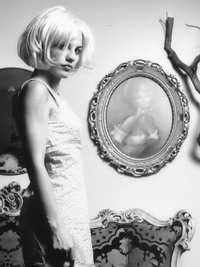All of the songs on The Bells of 1 2 were written and arranged over the past two years by Michalitsianos, a classically trained pianist and cellist, but her musical roots grow much deeper. Born in England, and growing up between there and Australia (with bits of Greece and other parts of Europe scattered about), she was raised with music in her blood, beginning to write songs as early as five years old. No sooner had we settled in one spot, that it was time to up and off to another. My one true constant was music. In the space between here and there, music wrapped me up in comfort and wonder, surrounding me in anything I wished to see and feel.
At sixteen, Sophie began writing music for television documentaries and swapping her vocal abilities for free studio time at the EMI studios in Australia. For the next few years, labels would approach her with offers, provided she shifted her image to fit their ideals and sing the pop songs their producers wrote. 'Being irritatingly ideal at that time in my life, I politely declined and continued on my own path of exploration'. Here Sophie reached a peculiar juncture, and went to university with the intention of becoming a diplomat, believing she could be of better use in such a role. She soon shifted courses and was accepted into the Sydney Conservatorium of Music, where she studied contemporary composition and orchestration. In due course, she began making a name for herself as Australias improvising rock cellist, touring with numerous acts, though the position soon wore itself out, and Sophie decided it was time to move on.
She moved to the US at twenty-three, and not long after touch down received word that Mark Linkous of Sparklehorse had heard her music and wanted her to join up with them for their tour with Radiohead. Sophie obliged, and afterwards found herself contributing on Sparklehorses albums, Good Morning Spider and Its A Wonderful Life.
After her time with Sparklehorse, Sophie continued pursuing numerous musical avenues, and eventually was able to afford moving to upstate New York, where she could finally set up a studio of her own, though even this conjured up its own burdens. Having the luxury of my own studio was great, but without an engineer to stop me, I destroyed most of what I wrote. To my dismay, my beloved music was turning into a gargantuan mirror and I couldn't stand it. Barely any songs made it out alive; the studio was like a war zone. Unbeknownst to her, a major change was approaching. One night, while Sophie was out, there was an explosion in her studio, which promptly melted every piece of gear she owned, taking the whole house and recordings with it. She relocated, and began rebuilding another studio from scratch, and it was here that Sol Seppy began to manifest itself.
'I couldnt see myself putting out a record before this,' says Sophie. The catalysts for The Bells of 1 2 had long been developing, but had taken time to firmly materialize into a cohesive vision, apparent on the record. As the sole voice and creator behind Sol Seppy, Sophie landed not only the role of writer and performer for The Bells of 1 2, but also that of engineer and producer, with some additional mixing duties by Paul Antonell; all in all, a very substantial task for one person to surmount. As a result, the record is a true testament to the kinetic power of ones own emancipation from the weighty trials that come hand in hand with the creative gift. There was a strange joy around these songs in the studio. This haunting, yet uplifting underpinning permeates most of the songs on the record.
